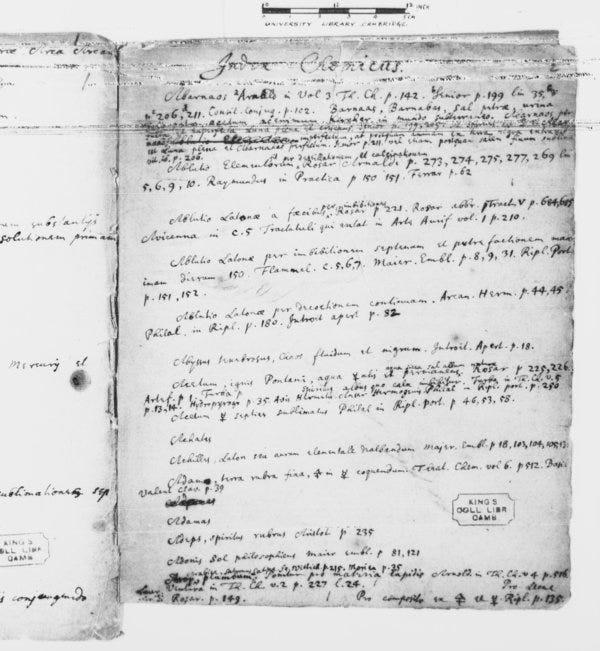Newton's Alchemy Notes
"☉ ☽ ♂ ♃ ☿"
I love studying notes because they reveal the person behind remarkable artistic or scientific achievements. For example, behind Newton’s theories of light and gravity, behind his calculus, we find an ardent alchemist.
Newton’s notes reveal a man obsessed with finding the philosopher’s stone—the elixir of life. He met with shadowy figures to copy their notes (a “Mr. F.”, a “W.S.”). By the end of the 16th century, he had amassed more than five-thousand references on alchemical literature. He catalogued it all in his Index Chemicus:

Newton kept all of this secret. And his alchemical research remained hidden until the 1930s when the economist John Maynard Keynes bought a series of “secret” manuscripts. They turned out to be Newton’s alchemical notes.
Alchemy is an ancient form of chemistry, specifically concerned with transforming base metals into gold and finding the elixir of life. While Newton criticized another occult practice (astrology), he devoted nearly half of his life to alchemy.
In Newton’s pre-Newtonian world, “alchemy was in its heyday” even if alchemists were considered charlatans.1 Newton knew this and devised a secret pseudonym: Jeova sanctus unus, an anagram of Isaacus Neuutonus.2
So, join me on this exploration of Newton’s occult practices and his obsession with alchemy.
The rest of this post is for paid subscribers. You can read my full essay on Newton for free here. If you value the time and energy that goes into Noted, please consider becoming a paid subscriber. You’ll get additional weekly content, and you’ll help keep this newsletter going!
Keep reading with a 7-day free trial
Subscribe to Noted to keep reading this post and get 7 days of free access to the full post archives.


